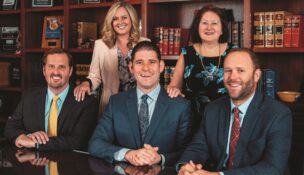The Holistic Divorce: How to Separate the Family Unit Without Destroying It
The Holistic Divorce: How to Separate the Family Unit Without Destroying It
![]()
As another year comes to a close, people are engaging in significant self-reflection and setting goals for the new year. It may come as no surprise that, in January, family law practitioners see an uptick in people coming to their offices for divorce advice. Those conversations – and even thoughts of divorce – are, of course, fraught with fear: Will I ruin my children? Will I be able to afford this? Do I have the mental strength to make it through this change? No doubt, a divorce is one of the toughest transitions for adults and children alike. While a "holistic" divorce may sound like new-aged mumbo jumbo, it actually is possible to separate in a conscientious way that minimizes the risk to your future and your children's wellbeing. If you are thinking about divorce in the new year, consider a holistic, collaborative divorce.
WHAT IS A COLLABORATIVE DIVORCE?
In a collaborative divorce, both parties commit to settling their case outside of court through a series of settlement conferences – also known as team meetings – where the parties, their collaboratively trained attorneys, and a neutral collaborative facilitator (CDF) meet with a planned agenda of topics to be tackled.
Ultimately, the goal is to reach solutions that meet both parties’ needs, and the family’s needs, rather than each side sticking to rigid legal postures. Just because you can argue something, or have the right to take a position, does not mean it serves the family as a whole. Collaborative divorce is a shift away from the litigation dynamic, which is position-oriented, to a higher view, addressing the overall needs of the family unit. This allows for more creative solutions that may not be available to a judge in a formal courtroom setting.
HOW WILL WE GET ALONG?
One might ask, how is this accomplished when tensions are high and people may revert to natural fight or flight instincts to protect themselves?
At the commencement of the process, a mission statement is developed, outlining the goals and expectations of both parties. While this may sound gimmicky, when things get tough and people become elevated, it is important to have this overarching goal to correct the course of settlement. These goals should be interest-based, as opposed to positions-based: e.g. “We desire a parenting arrangement that is healthy for our children and keeps both parents very involved,” versus “I must have 50/50 parenting time.”
It is also important that, at the commencement of the collaborative divorce, both parties reflect and commit to being their best selves. If you and your spouse are truly committed to keeping the conflict as minimal as possible and to working through tough situations in a way that avoids harm to the family, it is important that each be able to return to the attributes that make them their best self. How do you behave when you are at your best? What attributes do you display when you are fully engaged? Collaborative divorce takes time to focus on the interpersonal relationship between a separating couple to reduce anger, fear and hatred – for the adults and their children.
YOUR "A" TEAM OF ADVISORS AFTER A DIVORCE
The CDF is essential to this process. Generally, this is a mental health professional, though it may be a neutral attorney. No matter the licensure, this person must be trained and experienced as a CDF. Collaborative divorce is challenging. An individual who does not have experience in the complexities of a collaborative case will likely fail to get the case over the finish line and may even make things worse. The CDF helps build trust between the attorneys and spouses, while maintaining strong boundaries, holding team members accountable and helping resolve impasse.
It is similarly essential that both parties choose attorneys who are collaboratively trained and have experience dealing with such matters. Whereas litigation is about following legal processes and procedures to be a zealous advocate, collaborative divorce is about building trust within a team setting, using legal skills and know-how to reach creative solutions, all the while protecting the client. However, the overall goal is not to get as much as possible; rather, it is to reach agreements that meet the best interests of the family. An attorney who does not understand the collaborative model may unnecessarily ramp up conflict and cause harm to the parties involved. When meeting with an attorney, speak about driving philosophy to decide if they will be drawing blood or thinking creatively to accomplish your goals in a collaborative way.
Finally, collaborative divorce is holistic. It allows the parties to work with any neutral professionals they feel are needed for their particular circumstances. Financial neutrals, experts regarding trust assets or the particular needs of a young child – each of these individuals may be called to join team meetings as deemed necessary.
WHAT HAPPENS IF WE CAN'T SETTLE?
Certainly, not all cases are cut out for collaborative divorce.
While the likelihood of settlement is high in a collaborative setting (after all, the judge will settle the case in one way or another, so why can’t you?) there are some parties who simply cannot be their best selves in a divorce. If there are issues of domestic violence, revenge or hidden assets, for example, a collaborative divorce is not the right model.
However, very difficult conflict can and often is addressed in a collaborative setting. When meeting with an attorney, be very honest about the facts of your marriage so the attorney can truly assess whether or not Collaborative Divorce is an option for you.
Divorce is scary and difficult. Collaborative divorce does not change this, but it provides a structure and the resources for the most healthy and holistic results. Anyone contemplating divorce in the new year should review collaborative divorce to see if it’s a viable option for their family.
CHEATERS: THIS IS HOW YOU'RE GOING TO GET CAUGHT
 A shareholder at Griffiths Law PC, Elizabeth Bonanno specializes in collaborative divorce as well as complex divorce, parental responsibilities, child relocation and child support matters. Elizabeth was selected for inclusion as a Colorado Super Lawyer Rising Star in both 2017 and 2018 and was named an Up and Coming Lawyer by Law Week Colorado
A shareholder at Griffiths Law PC, Elizabeth Bonanno specializes in collaborative divorce as well as complex divorce, parental responsibilities, child relocation and child support matters. Elizabeth was selected for inclusion as a Colorado Super Lawyer Rising Star in both 2017 and 2018 and was named an Up and Coming Lawyer by Law Week Colorado













